Zinc Role Beyond Immunity
Zinc is an essential trace element which helps in regulating lipid, protein and nucleic acid metabolism. It facilitate wound healing, decrease skin inflammation, support immune function, tissue growth, and maintenance of thyroid optimal function.
Here in this blog we explain everything you must know about zinc’s benefits, functions, deficiency symptoms, food sources, recommended dosages, and potential side effects.
What is Zinc?
Zinc is a nutrient that plays several roles in our bodies. It is an essential component in more than 300 metalloenymes and more than 2000 transcription factors. Moreover, it is essential for health and wellbeing, including
- Growth and development
- Immune support and wound healing
- Small intestine (GI) structure and function
- Neurological function
- Antioxidant and glycemic control
- Fertility, pregnancy and lactation
Benefits of Optimal Zinc Intake
Research proves that optimal zinc intake shows several health benefits.
Immunity System Booster
Zinc supports keeping our immune system strong. It is needed for immune cell function and cell signaling. Hence deficiency may lead to a weak immune response. Moreover, zinc intake can also reduce the risk of infection by promoting immune response in adults.
Accelerates Wound Healing
Hospitals commonly use zinc to treat specific skin injuries, burns, and ulcers. This mineral is vital in synthesizing collagen, inflammatory response, and immune function. It is needed for proper healing.
Reduces Risk of Age-Related Problems
Zinc can potentially reduce the risks of age-related diseases like AMD, pneumonia, etc. Moreover, it can also help to relieve oxidative stress. It also helps boost the activity of T cells and natural killer cells, which protect the body from infection. Adults also experienced an improved response to the influenza vaccine. It also helps to boost mental performance.
Treat Acne
Nowadays, acne has become a common skin disease that affects the Global population. Obstruction in oil-producing glands, inflammation, and bacteria cause acne. Studies on this show that using zinc can effectively reduce inflammation. Since zinc inhibits the bacteria and suppresses the oily gland’s activity, people with acne have lower zinc levels. So intake of supplements can help to reduce the symptoms.
Reduces Inflammation
Zinc reduce oxidative stress which result in reduction of inflammatory levels of specific proteins in the body. Moreover, this inflammation can contribute to several health diseases like heart diseases, mental decline, and cancer.
Gut Health
Zinc plays a vital role in intestinal and gut health. If a person consumes very little zinc, there are chances for the intestinal barrier to fall apart. However, over dosage can cause a shift in the gut microbiome, which results in diarrhea and inflammation.
Fertility
Zinc is quite important for both male and female fertility. As an antioxidant zinc protects male sperm from excess heavy metals, fluoride, ROS, heat etc. For female zinc helps on the metabolism of androgen, estrogen and progesterone.
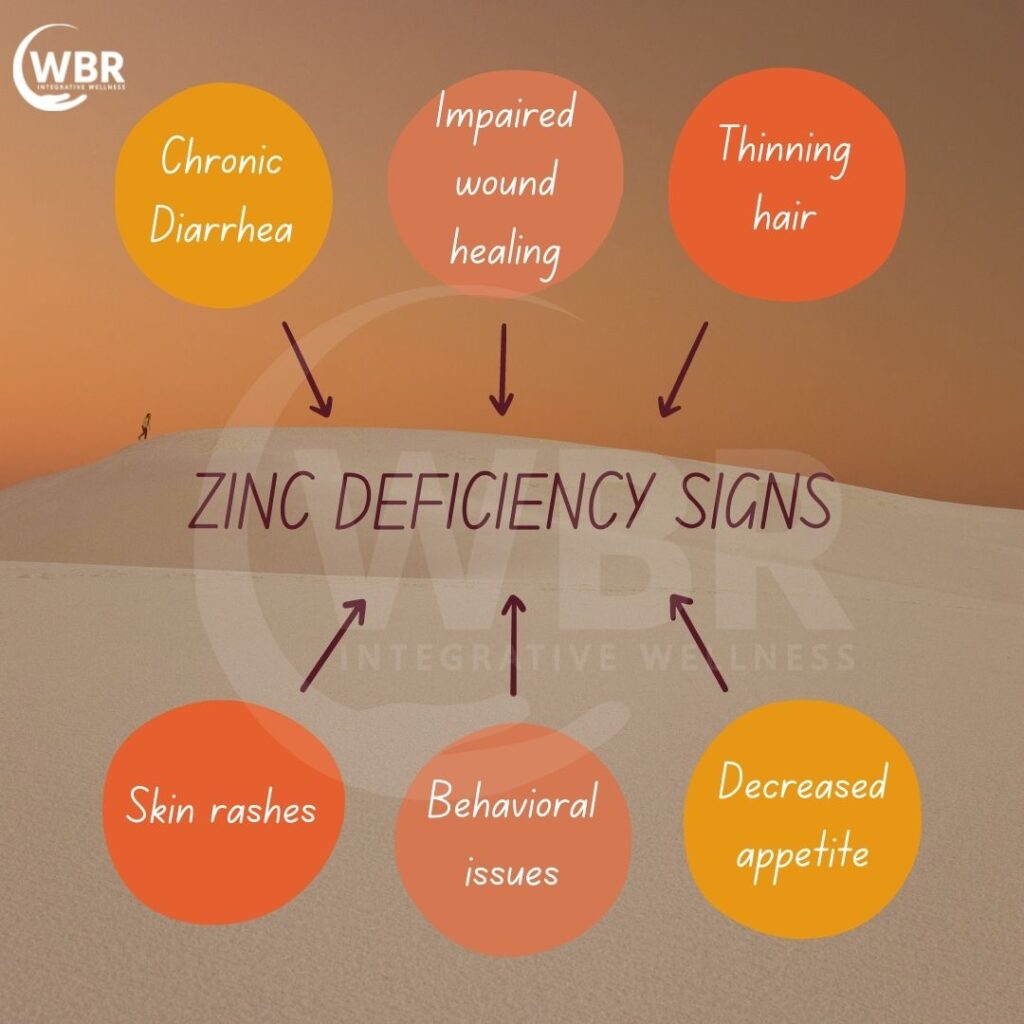
Zinc Deficiency Symptoms
Zinc deficiency is a rare problem seen in people with genetic mutations. Deficiency may be hereditary or acquired. Intestinal absorption is dependent on pancreatic function, zinc-binding factors, and albumin transport.
The following are the significant symptoms of zinc deficiency
- Impaired growth and development
- White spots on nails
- Susceptible to colds, infection, and flu
- Delay in sexual maturity
- Acne and rashes on the skin
- Chronic diarrhea
- Impaired wound healing
- Behavioral issues
- Thinning hair
- Decreased appetite
- Reduces sense of smell or taste
It is common to see milder forms of deficiency in developing countries where children do not get proper nutrition. It is roughly estimated that approximately 2 billion people suffer from zinc deficiency. Since zinc deficiency is paired with the immune system, there are high chances of getting infections and even death in rare cases.
People Who are at the Risk of Zinc Deficiency Include
- Persons suffering from gastrointestinal diseases such as Crohn’s disease.
- Pregnant women.
- Breastfeeding mothers.
- Older children who majorly depend on breastfeeding.
- People who suffer from Sickle Cell anemia.
- Chronic kidney diseases.
- Alcohol addicts.
Since it is challenging to analyze actual symptoms, getting a laboratory test is good. Doctors also consider other factors like diet, genetics, and blood results to determine the supplements.
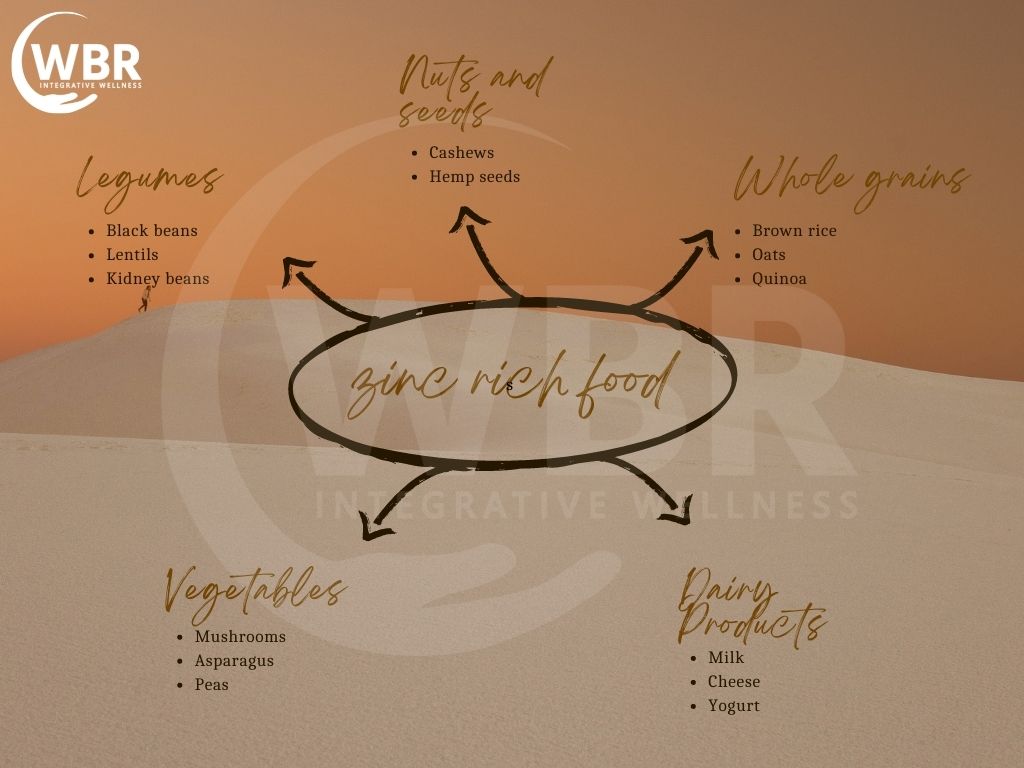
Sources of Zinc
Zinc is available in the form of food and supplements.
Food sources
Most plant food is rich in zinc naturally. Hence consuming zinc has become easy for most of us. Here is a list of zinc-rich foods.
1. Legumes: Black beans, Lentils, Chickpeas, Kidney beans, etc.
2. Nuts and seeds: Cashews, Hemp seeds, etc.
3. Dairy products: Milk, Cheese, and Yogurt
4. Whole grains: Brown rice, Quinoa, Oats, etc.
5. Vegetables: Asparagus, Mushrooms, Peas, Beet, Greens, and Kale
Nowadays, several food products are fortified with zinc supplements, such as cereals, baking flours, and snack bars.
Note: Add copper rich foods like macadamia nuts, kale, avocados, sesame seeds, cashews, mushrooms and dark chocolates (cocoa).
Supplements:
- Recommended daily dose shouldn’t exceed 40 mg/day except for the case of severe deficiency.
- Most suitable forms are zinc citrate, acetate, picolinate, gluconate, or sulfate.
- Zinc oxide has a poor absorption rate, so it is better to avoid.
- Daily intake shall be limited to 4-6 weeks.
- Keep a gap of 1-2 hours from magnesium, iron, fiber, prebiotics etc. for maximum absorption.
- Topical application is equally important and can be used for acne and for wound healing.
- Avoid supplements that contain sorbitol and mannitol.
Note: Kindly consult your medical practitioner before starting any supplement.
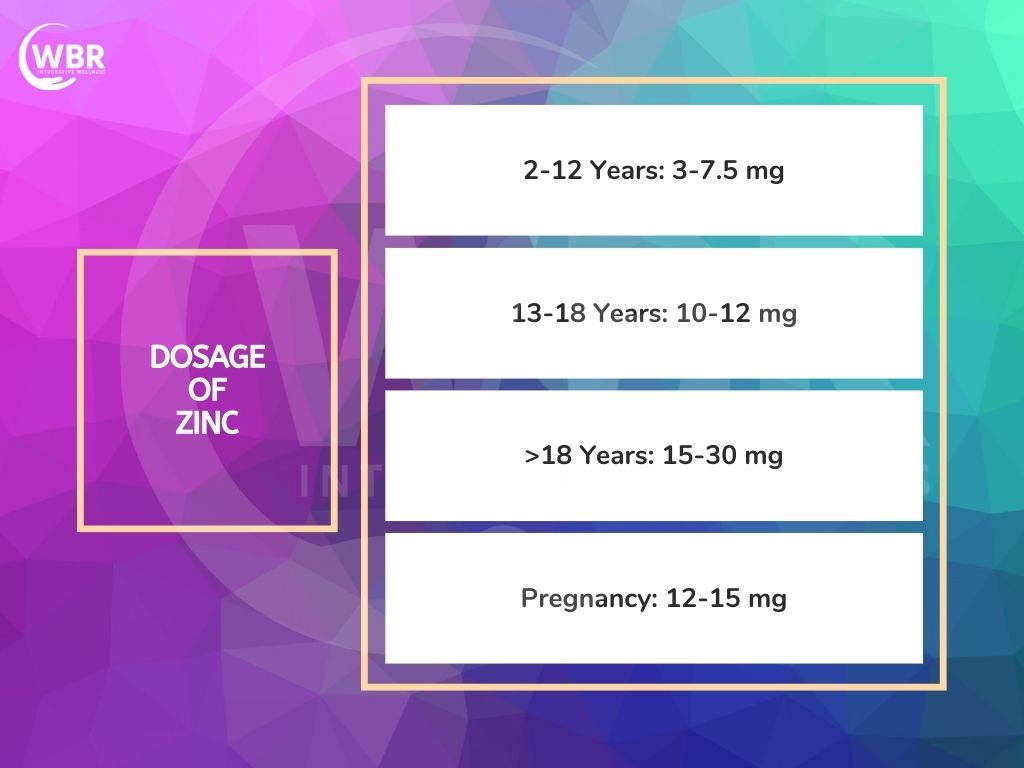
Zinc Toxicity
Overdose of zinc supplements can also cause acute to chronic symptoms as below:
- Diarrhea
- Nausea and vomiting
- Loss of appetite
- Abdominal cramps
- Reduced immunity
- Decreased HDL cholesterol levels
- Ingesting more zinc will also lead to deficiencies in several other nutrients, such as copper and iron.
Important FAQs
Nutritional Facts :
- Zinc deficiency reduces glutathione levels in the red blood cells.
- Zinc and copper are examples of nutrient partners, excess elevation of either one will suppress other.
- Plasma zinc is bound to its carrier protein albumin. Therefore, anything that alters albumin levels will change plasma zinc levels.
- Compounds in grains (phytates) and legumes (lectins) reduce the zinc absorption rate. Hence, vegetarians need supplement support once in a while.
- Coffee reduces zinc absorption so separate intake by 1-2 hours.
Clinical Facts :
- The surgery increases the need for zinc, vitamin C, and other nutrients involved in cellular tissue repair.
- Zinc deficiency increases the glycation of hemoglobin and lowers thyroid function.
- Cessation of growth in children is an example of severe zinc deficiency.
- Zinc along with cysteine and alpha lipoic acid can prevent blur of vision in the eye (AMD).
- Zinc is involved in regulating sleep through its role in nerve transmission in the brain.
- Deficiency of zinc has also been found in significant numbers of bulimic and anorexia nervosa patients.
- People with a deficit of zinc may experience depression-like and anxiety-like behaviours.
- Stress, infection, inflammation, usage of estrogen, oral contraceptives, and corticosteroids may lead to the reduction of plasma zinc levels.
- The serum copper to zinc ratio may be more predictive of inflammation than other biomarkers such as ESR, CRP, etc.
- Individuals with eating disorders and chronic dieters have low levels of zinc.
- Zinc deficiency can also lead to kidney diseases.
- Hypothyroidism, hypertension, diabetes, and acid-blocking medication can likely cause zinc deficiency.
- Zinc, iron, magnesium and selenium can help to reduce toxic load of cadmium if any.
-
Zinc deficiency is known to result in alopecia, dermatitis, insulin resistance, hormonal disruption, and dementia.
Conclusion
Zinc is an element essential for the body. Moreover, it is needed for several functions like metabolism, growth, immune function, etc. It also helps in reducing inflammation and risks related to age. Most of the population can meet the RDI through diet. People with different diseases may have less absorption. Proper dosage is essential as zinc supplementation can induce copper deficiency which can result in neurological conditions and thyroid disorder. It is always better to stick to recommendations and take supplements only when needed.
Reference:
https://academic.oup.com/advances/article/6/2/224/4616692?login=false
https://www.frontiersin.org/articles/10.3389/fmicb.2022.900740/full

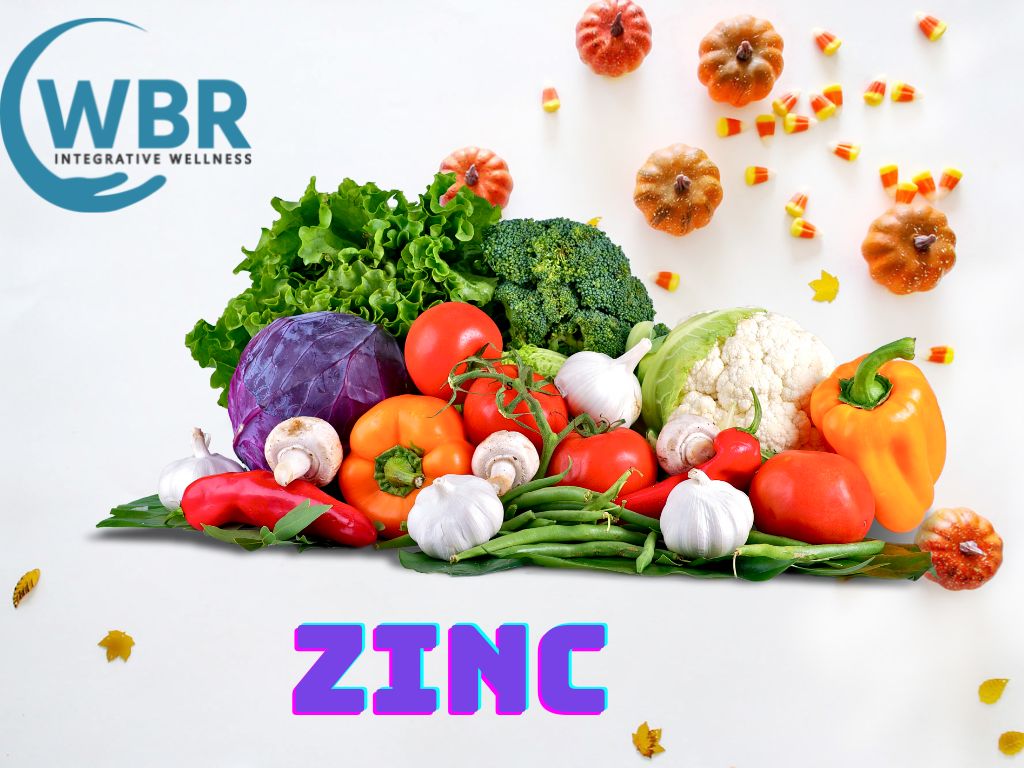




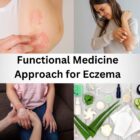



Supplements for Chronic Kidney Disease
13-Jul-24[…] Zinc is an essential nutrient for managing chronic kidney disease (CKD), addressing several deficiency-related issues. CKD patients often experience zinc deficiency, leading to impaired taste, reduced appetite, pruritus, and decreased erythropoietin responsiveness. Zinc supplementation improves these symptoms, enhancing taste acuity, and appetite, and alleviating pruritus. Additionally, zinc boosts immune function contributing to overall better health. […]